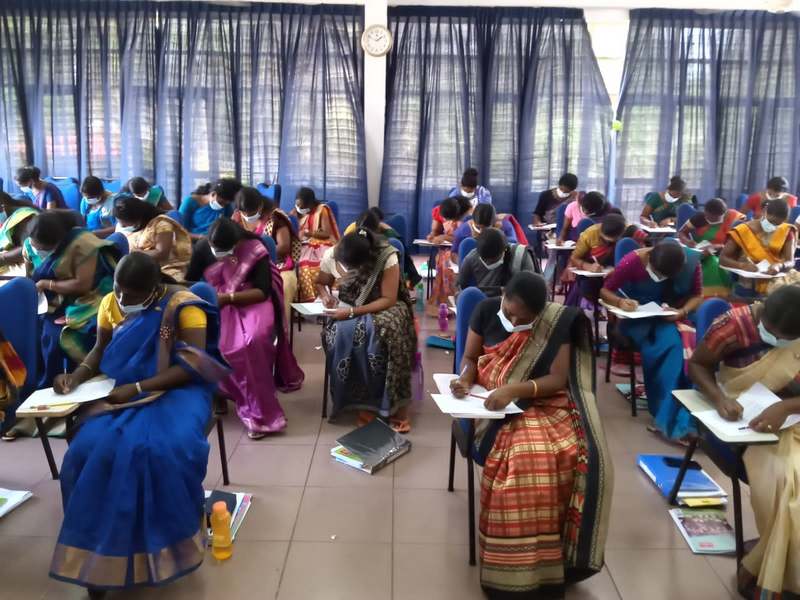
Health initiatives targeting RPC estate community gain momentum in 2021
- Stakeholder cooperation credited with minimising COVID-19 impact on plantation community
- Health programmes remain the priority among welfare efforts in 2022
- Plans underway to construct 35 new child development centres within 2022
Cooperation among key stakeholders significantly strengthened health initiatives covering communities in estates managed by the Regional Plantation Companies (RPCs) in 2021, helping minimise the pandemic’s adverse impact on the plantation community.
The Plantation Human Development Trust (PHDT) and the other constituent members of the PHDT – a tripartite organisation comprised of RPCs, Estate Trade Unions and the Government – worked hand-in-hand with the health authorities, to reduce the spread of the pandemic in RPC estates.

The vaccination drive and other measures to reduce the spread of the pandemic were given priority during the year. Progress was also achieved in long-term initiatives focused on the health and wellbeing of the plantation community, which are now being further amplified in 2022.
“Despite initial fears that the pandemic would spread rapidly among the estate community, its impact was minimised through proactive action and close collaboration among key stakeholders,” said Bhathiya Bulumulla, Chairman of the Planters’ Association of Ceylon – which represents the RPCs. “We thank the PHDT, health authorities and other Government bodies who assisted the RPCs in ensuring the wellbeing of the estate community, during this challenging period.”
Reflecting the success of the vaccination drive in RPC estates, at present, 60% of over 30 years residents have received two doses and a booster, while 97% have received at least both doses.
Complementing these efforts, a number of medications were also provided free-of-charge to the estate community, including 13 newly approved medications totalling 38 in 2021. These additional medicines, were provided by the State for treatment of ailments such as scabies, wasp & insect bites, allergies, worm infestation, anaemia, gastrointestinal diseases, wound dressing and short-term treatment of Diabetes and Hypertension etc.
The PHDT is also in the process of assisting in the smooth transfer of 59 estate hospitals to the Ministry of Health, as part of an ongoing process first commenced in 2021. Most recently, the PHDT also commenced its The ‘community kitchens’ programme, which seeks to enhance healthy dietary practices in estates, by both providing nutritious meals while raising awareness, was also expanded during the year.
Beyond health-focused initiatives, the PHDT completed 23 new child development centres (CDCs) during the year, while also commencing construction on 750 houses within RPC estates. Water supply and sanitation projects were also expanded during the year, benefiting approximately 4,000 estate residents families.
The RPCs and the PHDT intend to maintain and improve the momentum of these health initiatives during 2022. Accordingly, the PHDT will recommence health screening programmes across the estate areas in the country and community development and empowerment programmes to improve nutrition and wellbeing among mothers and children.
The PHDT also plans to construct 35 new child development centres within this year, bringing the total within RPC estate areas to 1,250 while 21 CDCs will also be renovated. In addition, 240 parental awareness programmes on psychosocial development of children will be carried out by the PHDT. The diploma-level training programme for 100 CDC officers will also be continued in 2022.
“It is noteworthy that the PHDT and other stakeholders were able to strengthen our long-term initiatives aimed at further improving the lives of RPC estate residents, while also successfully implementing short-term pandemic prevention measures,” said Lal Perera, the Director General of PHDT. “We will continue to ramp up these programmes during 2022, with the assistance of our partners.”
The PHDT is a tripartite organisation comprising the RPCs, Estate Trade Unions and the Government, established to enhance the quality of life of the plantation community. Since its establishment in 1992, the PHDT has facilitated the establishment of 15 water supply mega projects benefiting safe water and sanitation to 3,000 households while overseeing the construction of 50 km of estate roads. The PHDT has also been instrumental in the construction of 104 child development centres, re-roofing and repairing of 58,477 existing houses and the construction of 38,296 new housing units for estate sector communities.





